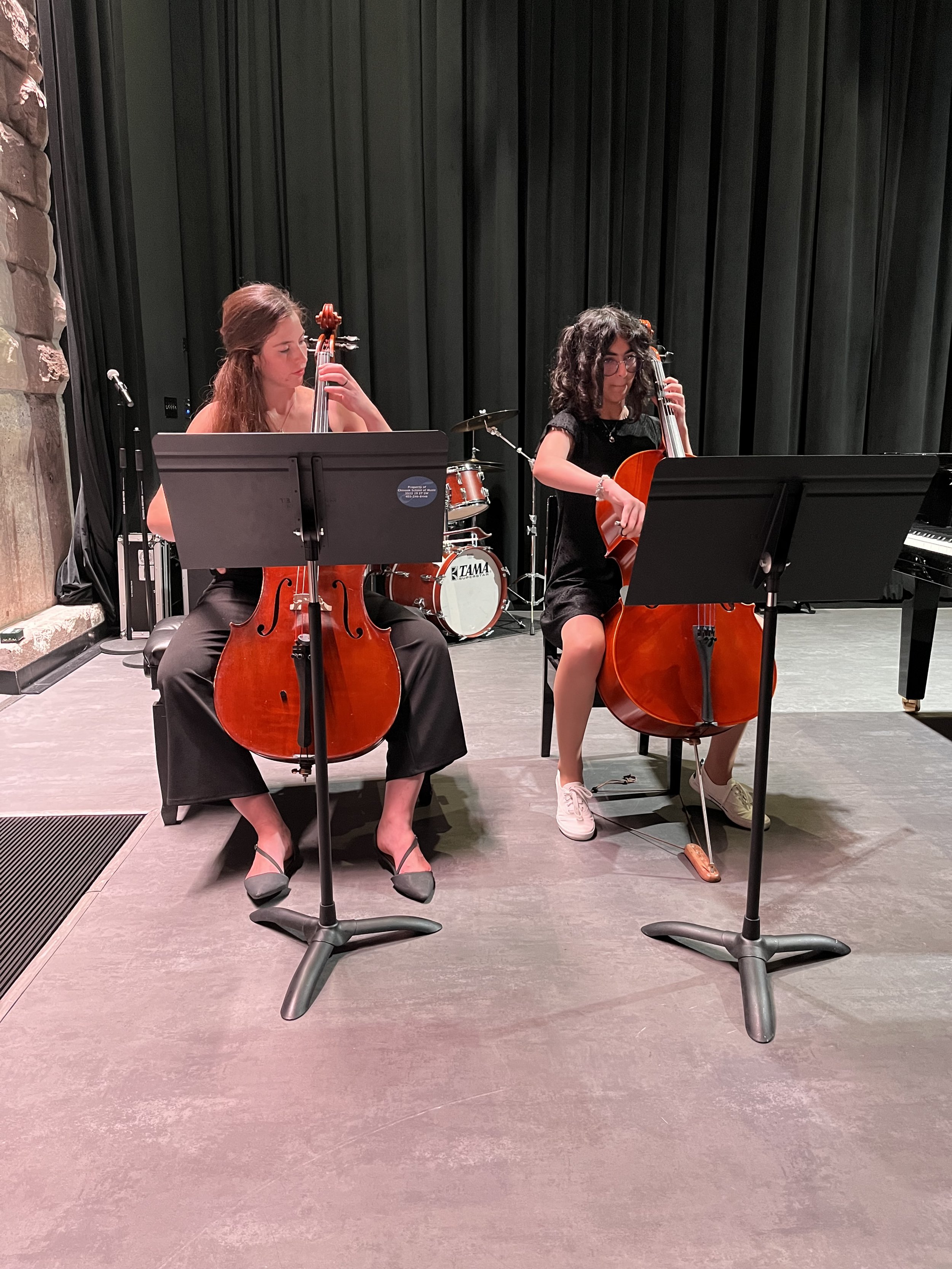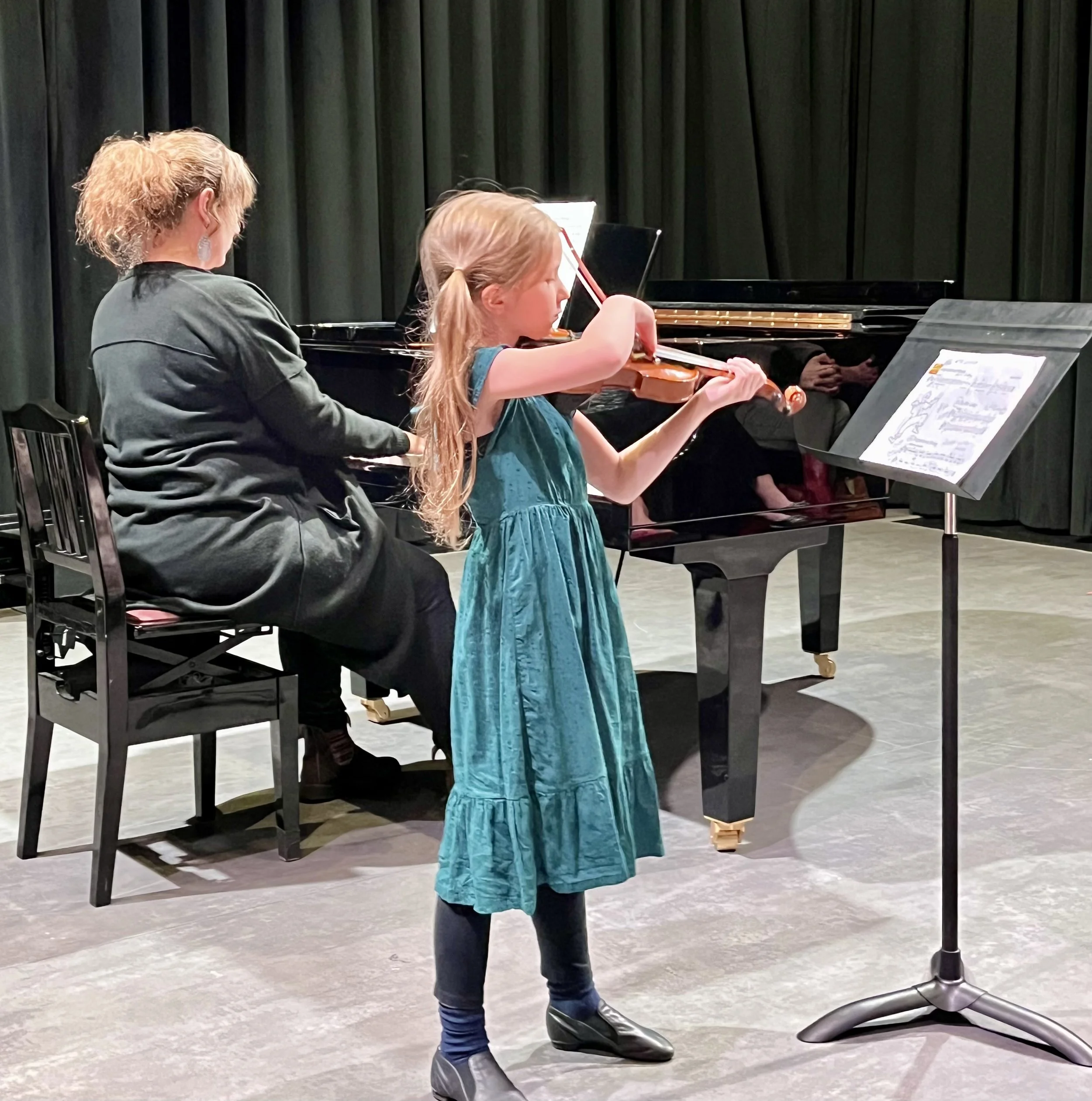Welcome to Mastering the Stage: A Guide to Performance Preparation for Young Musicians! In this blog post, we delve into strategies and insights to help musicians elevate their performance skills and confidence. From setting up engaging home concerts to mastering the nuances of stage etiquette, this comprehensive guide covers everything you need to create meaningful performance experiences.
Whether you're a young performer, an adult stepping onto the stage for the first time or a parent supporting your child, you'll find valuable tips to help make every performance successful and memorable.
Preparation and Practice
For All Students
To build strong performance skills and confidence, we recommend creating as many practice opportunities as possible that mimic real performances.
Home Performance Opportunities
Practicing to perform is very different than daily practice. When we practice performing, we don’t stop to correct mistakes. Instead, we focus on telling our musical story and engaging our audience.
Parents and caregivers
Set up mini-performance events at home. Invite friends and family members, or for younger children, create an audience of stuffed animals or toys.
Purpose of Mini Performances
These informal performances are a great way to practice stage etiquette and play through pieces without interruptions. Focus on expression and connection rather than perfection.
Encourage Musical Curiousity
Ask open-ended questions to inspire deeper musical thinking: What mood does this music create - joyful, calm, tranquil, or dramatic? Is there a story behind the music? Who might the characters be in this musical selection?
String Players, Instrumentalists and Vocalists
An important part of preparation is your rehearsal with your accompanist. Ensure your piece is well-prepared and memorized before your rehearsal. Know your expressive choices, tempo, and choreography and communicate these nuances clearly with your accompanist. Always say thank you! Accompanists work hard and are an essential part of your performance.
Vocalists
Stay Hydrated! Begin drinking plenty of water several days before your performance. Hydration on the day of is too late. Your vocal folds require moisture to function well.
Maintaining a Performance-Ready Piece
Once your piece is memorized and performance-ready, it’s important to maintain it. Here are some tips:
Practice with your music even if the piece is memorized. Sometimes our brains go on “automatic pilot” and we start to forget the small details in the music.
Practice mentally. Hear the music in your mind while following the notes on the page.
Slow practice. Keep control over tricky passages.
Use your imagination! Bring your music to life with creative imagery.
Positive mindset. Confidence grows with belief in yourself!
Day-Of Preparation
Managing Nerves
Feeling nervous is normal. Musicians often experience an increase in heart rate and adrenaline before a performance. These sensations can actually help sharpen focus.
To calm your body before a performance, try this breathing exercise: exhale fully through your mouth until your lungs feel empty, then let your lungs refill naturally. Repeat several times to slow your heart rate and feel grounded.
Eat well. Don’t perform on an empty stomach. Bananas are a great option as they contain a calming factor and are a great source of energy.
Vocalists:
Avoid consuming dairy which can create mucus.
Warm Up. Do your usual vocal exercises before arriving to your performance, but avoid over-singing. Keep your voice fresh for the performance.
Bring water. Sip while you wait your turn.
Guitarists and String Players:
Arrive early to tune your instrument. Ask an instructor for help if needed. Always double check your tuning before going on stage.
Concert Attire: Dress to Impress!
Dress pants, dress shirts, longer skirts or dresses and dress shoes. Ties and bow ties are optional.
Be comfortable! Performance clothing should be non-restrictive.
Dress shoes: practice walking and performing in your dress shoes, especially if they have heels.
Keep hair off your face so your audience can see your expression.
Avoid bright nail polish or excess jewelry that can become a distraction to you when performing.
Bring a Copy of Your Music to Your Performance
Even if you are performing from memory, always bring a copy of your music to the performance venue. Having your music can provide comfort before your turn. If your accompanist or adjudicator/clinician requires your music, you’ll be ready. (For festivals and masterclasses, an original copy of your music is required.)
Stage Etiquette
Common performance practice includes a bow both before and after your musical selection. Musicians should practice walking to the piano or with their instrument in a well-paced, confident manner.
How to Bow:
Stand tall with feet together and arms by sides. Smile, bend forward slowly at the waist, then rise and smile again.
Before Performing:
Take a moment to plant your feet, relax your body and take a deep breath.
If something doesn’t go as planned, stay calm. Often the audience won’t even notice, unless you show it!
Guitarists:
Settle comfortable on stage. Adjust your footstool or amp as needed and test out the volume by strumming a note or chord before you start playing your selection.
Maintain a good playing position – shoulders back, head high.
Vocalists and String Players:
When ready, make eye contact with your accompanist, give a small nod or smile to signal the start.
Set your tempo. Your accompanist is trained to follow you!
Remain in character until the final note of the piano fades.
Take a bow and then gesture toward your accompanist with a smile and thank them.
Vocalists:
Before singing, check your posture: feet apart, knees loose, shoulders relaxed, hands unclenched.
if using a microphone, stand close enough for a clear sound but don’t touch it. Once set, try to forget it’s there and focus on your song.
Enjoy yourself!
This is your moment to shine! You’ve worked hard, now enjoy the sense of accomplishment that comes from dedication and hard work.
Remember, not every performance will go perfectly, and that’s okay. There may be some surprises along the way and this is the nature of the game! Performing builds resilience and confidence. And the more you do it, the easier and more rewarding it becomes!








